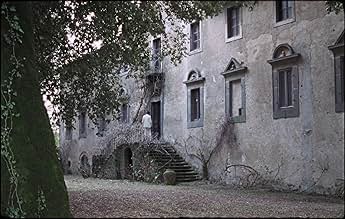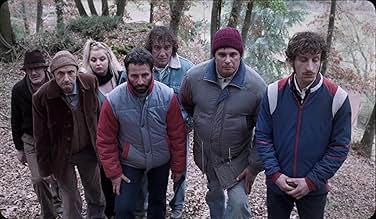Der englische Archäologe Arthur trifft sich wieder mit seinen unberechenbaren Komplizen - einem fröhlichen Kollektiv von Grabräubern, die durch das Plündern etruskischer Gräber und das Horte... Alles lesenDer englische Archäologe Arthur trifft sich wieder mit seinen unberechenbaren Komplizen - einem fröhlichen Kollektiv von Grabräubern, die durch das Plündern etruskischer Gräber und das Horten der ausgegrabenen antiken Schätze überleben.Der englische Archäologe Arthur trifft sich wieder mit seinen unberechenbaren Komplizen - einem fröhlichen Kollektiv von Grabräubern, die durch das Plündern etruskischer Gräber und das Horten der ausgegrabenen antiken Schätze überleben.
- Regie
- Drehbuch
- Hauptbesetzung
- Auszeichnungen
- 14 Gewinne & 53 Nominierungen insgesamt
Empfohlene Bewertungen
Arthur, the disheveled former archaeologist turned Etruscan tomb-finder, is a man on a quest. When we first meet him, he is dreaming on a train heading home after being released from prison. Once home, he soon falls in with his old gang of tombaroli (grave-robbers) and they're on the search for treasure in the earth. For the rest of the gang, treasure means loot from Etruscan tombs; Arthur seems to be searching for something else. We get clues to Arthur's search in recurring images of a young woman and her red thread first seen in the opening shots of the film. The woman, we soon learn, is Beniamina, the daughter of Flora and Arthur's beloved. Flora lives in a crumbling palazzo with Italia, her singing student, and a group of women who call Flora mother. Italia is being exploited as a servant by Flora, who believes she is tone-deaf, but Italia in turn is raising two children in the house unbeknownst to Flora. The film juxtaposes these two kinds of groups: the rival groups of tombaroli led by men and the communal groups led by women (Italia forms the second group in a disused railway station), which echoes the remark early in the film that Italy would be much less macho today if the Etruscans had beaten the Romans rather than the other way around.
The film is full of mythic and historical resonances. Arthur is a latter-day Orpheus searching for his Eurydice (the first musical cue is from Monteverdi's Orfeo), but without Orpheus's gift of music. The red thread recalls Ariadne and the labyrinth. Flights of birds (and ominous pigeons) follow Arthur. Italia's first language is Portuguese and her children are of many ethnicities. And so on. In the hands of a lesser director or screenwriter this hybrid creature of different parts (you might call it a chimera) could have been a mess, but here everything seems to cohere and to create a mythic world that resembles our own, but is at an angle to it. That everything clicks into place so precisely and beautifully in the final scene is a tribute to just how tightly this loose-seeming film is constructed. Rarely have the loose threads of a plot been gathered with as much skill or in a more satisfying way.
Many of the photographic tricks (different film stocks, different aspect ratios, scenes undercranked) sound gimmicky, but, except for the undercranking, most are there for people who notice and transparent to those who don't. The cast is uniformly excellent.
For all its playfulness and its conceits, this moving, elegiac film tells the story of a great love and is a great love story.
The film is full of mythic and historical resonances. Arthur is a latter-day Orpheus searching for his Eurydice (the first musical cue is from Monteverdi's Orfeo), but without Orpheus's gift of music. The red thread recalls Ariadne and the labyrinth. Flights of birds (and ominous pigeons) follow Arthur. Italia's first language is Portuguese and her children are of many ethnicities. And so on. In the hands of a lesser director or screenwriter this hybrid creature of different parts (you might call it a chimera) could have been a mess, but here everything seems to cohere and to create a mythic world that resembles our own, but is at an angle to it. That everything clicks into place so precisely and beautifully in the final scene is a tribute to just how tightly this loose-seeming film is constructed. Rarely have the loose threads of a plot been gathered with as much skill or in a more satisfying way.
Many of the photographic tricks (different film stocks, different aspect ratios, scenes undercranked) sound gimmicky, but, except for the undercranking, most are there for people who notice and transparent to those who don't. The cast is uniformly excellent.
For all its playfulness and its conceits, this moving, elegiac film tells the story of a great love and is a great love story.
When an English tomb raider (Josh O'Connor) skilled at dowsing uses his skills to hunt down buried Etruscan artifacts, he achieves success at his craft but suffers setbacks when he falls in with the wrong crowd. As a consequence, he drifts through life, trying to find his way (and, ironically enough, a moral footing), an odyssey filled with quirky people and events, a would-be romantic interest (Carol Duarte) with two carefully concealed children, an aging operatic instructor (Isabella Rossellini) skilled at fleecing her "students," and, of course, his coterie of comical criminal cronies. Writer-director Alice Rohrwacher's latest tells a delightful fable full of wit, whimsy, colorful characters, high intrigue and its share of surreal moments, all set against the Italian landscape. The film admittedly takes a little time to find its stride, so getting through the opening act will require some patience (editing here would have helped). But, once the picture finds its way, it becomes a fun-filled ride, peppered with absurdist humor and filmed with Fellini-esque cinematography and a production design reminiscent of the famed auteur. With a runtime of 2:10:00, it could stand some trimming (most notably at the outset, as noted above), but this cinematic charmer is a modestly pleasant diversion to watch while stretched out on the couch while casually savoring a demitasse of espresso and a plate of biscotti. Godere!
A rather scruffy looking Josh O'Connor is "Arthur" who has found a way to make a living in rural Italy where he uses his unique gift with a divining rod - well a big twig, really - to uncover ancient artefacts from deep beneath the surface. He's not averse to a bit of grave robbing either - for which he has recently been imprisoned, and now he and his cohorts sell their stuff to "Spartaco" (Alba Rohrwacher) and via a rather unique technique, too! What's clear is that "Arthur" is getting over something fairly monumental in his life, and we get a clue to that when he visits the rather doting but blissfully ignorant and elderly "Flora" (Isabella Rossellini) at her increasingly dilapidated mansion house where the furniture is destined for the furnace and her family all know the secret, but dare not speak it. He, himself, inhabits a shanty-town style shed abutting the old city wall, his once proud linen suit now grubby and filthy and he is rarely without a cigarette. As the plot unfolds - aided by an agreeably sparing amount of dialogue - we start to get a sense that "Arthur" is actually coming to his senses after something akin to a concussion. The pieces of his life are slowly coming together again as he and his pals make the discovery of a lifetime, only for... It's a slowly paced film, but that works well - as do the infrequent but quite punchy comedic elements of the drama. There can be a comparison drawn between the gradual unearthing of the long lost relics and with his own re-realisation but it's all delivered with a brightness that keeps it from becoming downbeat or depressing. Director Alice Rohrwacher offers us a personal story tempered with a bit of mythology and a fair degree of ill-defined humanity that is compellingly incomplete in many ways. I reckon it might merit a second watch, there's plenty of nuanced writing here.
"La Chimera" is a bittersweet addition to the magical-Italian-realism cinematic universe of director Alice Rohrwacher. Her new parable about Italy that's also a folklore fairytale tells the story of clairvoyant/haunted archeologist/graverobber Arthur, played by Josh O'Connor. Arthur's journey to retrieve the film's buried namesake is not one for glory and it's barely for riches; O'Connor commits both emotionally and physically to a naturalistic portrait of a lost man searching for something that is beyond the tangible. This heavy-hearted quest is balanced thanks to moments orchestrated by Arthur's local gang of merry graverobbers, played by former collaborators from Rohrwacher films. Another great performance is by Isabella Rosellni, playing a women that is connected to Arthur through personal history and in her attachment to living in the past. The film is far less narrative-driven, instead choosing to follow Arthur from one moment to another, a nod to the wandering man of other Italian greats, Pasolini and Felini. The ending, similarly, leaves viewers with the choice of deciding whether Arthur was victorious in fulfilling his wish or not.
Poetry is the first word that comes to mind when trying to describe that movie. Alice Rorhwacher depicts a world where past and present are interwoven. A forgotten rural Italy, haunted by the remnants of Antiquity. The movie is full of symbols, and the boundaries between past and present, life and death, reality and fantasy are constantly blurred.
The main character, Arthur, is marked by grief, and hides his pain among a band of gentle thieves. All around him, there is misery but also resilience, joy, survival. In this picaresque landscape, Arthur seems to be the only character inhabited by tragedy.
Rorhwacher has the power to evoke emotions that are hard to describe. I left the theater in a contemplative state and I've been thinking about the movie a lot since then. Only good movies can do that.
The main character, Arthur, is marked by grief, and hides his pain among a band of gentle thieves. All around him, there is misery but also resilience, joy, survival. In this picaresque landscape, Arthur seems to be the only character inhabited by tragedy.
Rorhwacher has the power to evoke emotions that are hard to describe. I left the theater in a contemplative state and I've been thinking about the movie a lot since then. Only good movies can do that.
Wusstest du schon
- WissenswertesJosh O'Connor filmed the first half of La Chimera prior to filming his role as Patrick Zweig in Challengers, then returned to Italy to complete the second half.
- Soundtracks'Toccata-Ritornello-Sinfonia' from 'L'Orfeo'
Composed by Claudio Monteverdi
Performed by Le Concert des Nations & La Capella Reial de Catalunya
Conducted by Jordi Savall
Top-Auswahl
Melde dich zum Bewerten an und greife auf die Watchlist für personalisierte Empfehlungen zu.
- How long is La Chimera?Powered by Alexa
Details
- Erscheinungsdatum
- Herkunftsländer
- Sprachen
- Auch bekannt als
- La quimera
- Drehorte
- Produktionsfirmen
- Weitere beteiligte Unternehmen bei IMDbPro anzeigen
Box Office
- Budget
- 9.600.000 € (geschätzt)
- Bruttoertrag in den USA und Kanada
- 1.004.503 $
- Eröffnungswochenende in den USA und in Kanada
- 44.511 $
- 31. März 2024
- Weltweiter Bruttoertrag
- 5.234.788 $
- Laufzeit
- 2 Std. 11 Min.(131 min)
- Farbe
- Sound-Mix
- Seitenverhältnis
- 1.78 : 1
Zu dieser Seite beitragen
Bearbeitung vorschlagen oder fehlenden Inhalt hinzufügen






























